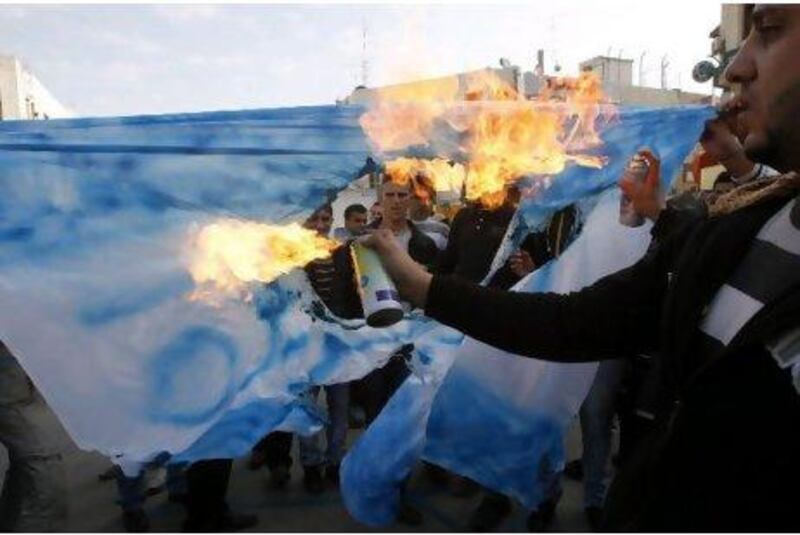RAMALLAH // Two days ago, several beefy young men carrying placards reading "Al Jazeera = Israel" gathered at the TV news network's office in Ramallah. They threatened to break office doors and spray-painted "Al Jazeera are spies and beasts" on elevators and walls.
They descended on the office after the Qatar-based news network began on Sunday night revealing details of the so-called Palestine Papers, a collection of secret documents about recent Israel-Palestinian peace negotiations whose disclosure has proved highly embarrassing to the Palestinian Authority (PA). The internal documents showed that Palestinian leaders had offered broad concessions on two of the thorniest issues in negotiations with Israel: Jerusalem and the fate of Palestinian refugees.
Some Al Jazeera employees feared the situation could have spiralled out of control had Palestinian police not stopped the men.
People in the building suspect that Fatah, the political faction led by the PA president, Mahmoud Abbas, was behind the scene, although they have no proof.
Palestinian officials, who once shut down the office for reporting "false news", have denied any involvement. But they are openly unhappy with the Qatar-based network's disclosure of the documents.
Yasser Abed Rabbo, a top aide to the Palestinian president, called the coverage "a political campaign of the first degree" and characterised it as "a political decision at the highest level from our brother in Qatar".
He concluded: "What Al Jazeera is doing today is an attempt to distort the national position of the Palestinian leadership."
While not mentioning Qatar by name, another aide to Mr Abbas, Nabil Abu Rdainah, cited the Palestine Papers as evidence of a conspiracy involving "Al Jazeera, Israel and other parties in the region".
Al Jazeera has previously been accused of politically motivated coverage. Three years ago it allegedly toned down criticism of Saudi Arabia at the request of the Qatari emir, Sheikh Hamad bin Khalifa al Thani, who apparently wanted to improve the country's long-strained relations with the kingdom.
Palestinian criticism of the network is not new, either. Al Jazeera's Ramallah offices were shut down two years ago after it broadcast claims that Mr Abbas was involved in the death of the Palestinian leader, Yasser Arafat, in 2004.
And a year ago, a series of large billboards criticising Qatar for its relations with Israel were erected throughout Ramallah.
Saleh Abdel Jawad, a political analyst and professor at Birzeit University, said: "They were up for weeks, and they were in the main places in Ramallah. Huge ones, 10-by-10 metres. Things that big couldn't have been put up without the explicit approval of Fatah and the PA."
He said the billboards were an indication that the PA was already feeling threatened by the network and showed that Fatah "was taking things personally".
Mr Jawad said it also suggested that Fatah was not inclined to accept a free and independent media. "I really don't feel Al Jazeera are against the Palestinian Authority or against Fatah," he said.
However, some see evidence of Qatar's foreign policy at least indirectly influencing Al Jazeera's programming, sometimes in directions that run counter to PA policies.
The country has made a name for itself by pursuing unusually active and seemingly contradictory foreign policy objectives. For example, it fiercely denounced the US invasion of Iraq in 2003 even though American forces used its bases on the island to stage it.
Its relatively warm relations with Lebanon's Hizbollah movement and Hizbollah's main benefactor, Iran, have irked the moderate Arab states that the PA has allied itself with.
Al Jazeera, said Khader H Khader, a Palestinian political analyst from Jerusalem, is "not in line with these countries' policies".
"And of course Qatar, as a country, is also not taking the line of Egypt, Jordan and Saudi, and neither so much with Syria and Iran. It's somewhere in between."
Mr Khader said he doubted that the network had an agenda against the PA and commended its coverage. But he still expressed uncertainty about its independence.
"If you look closely, there isn't a contradiction between Al Jazeera's reporting and Qatar's political line," he said.





